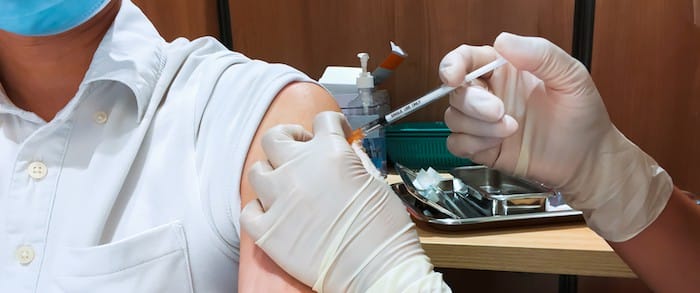The federal government has operated as the sole purchaser of all COVID-19 vaccines since the vaccines received Emergency Use Authorization (EUA) from the Food and Drug Administration (FDA) in 2020. But beginning in 2023, the federal government is likely to step back from its role as the sole purchaser of COVID-19 vaccines, as its current supply of vaccines becomes depleted.
The Biden administration, in September of 2022, requested an additional $9.1 billion in supplemental funding from Congress to continue COVID-19 vaccine procurement. However, members of Congress disagreed and did not provide this funding. The Health Resources and Services Administration (HRSA) recently announced that it will distribute $350 million to fund vaccination efforts at community health centers, hoping to ensure access to updated vaccines in underserved communities through the winter. With the lame duck Congress, the Biden administration is making one final push for an additional $8.25 billion in funding for COVID-19 vaccines and treatments. But it is unclear whether or to what extent Congress will grant additional funding, especially considering the previous failed attempts.
Additional vaccine funds are unlikely to delay a commercial transition
While any additional funding would be used to ease the transition to full commercialization of the COVID-19 vaccine market, even if granted, the funding does not seem likely to delay commercialization to any later than mid-2023, for a few reasons. First, the ask for funding is much broader than just for a supply of vaccines—its focus includes developing the next generation of vaccines and treatments. It is, therefore, unclear to what extent the additional funding would bolster the government’s supply of COVID-19 vaccine doses in the short term.
Second, the requested funding is far less than the $15 to $20 billion experts suggested would be required to support development of next-generation vaccines and therapeutics, as well as supporting long-COVID research, and providing global assistance, while smoothing the commercialization process. The requested $8.6 billion is even a reduction from the $9.1 billion sought in September.
While the Administration seeks additional funding, it has also begun preparation for a transition to a commercial market. On a recent webinar, the Department of Health and Human Services (HHS) stated that the COVID-19 vaccines market will likely be commercialized entirely by early to mid-2023, meaning that the federal government would no longer purchase COVID-19 vaccines, and that instead, the vaccine would be paid for by private payors in the commercial market and through traditional, more limited government vaccine procurement channels.
The administration has long expected and prepared for commercialization of the COVID-19 vaccine market, and has publicly positioned it as a question of when, not if. The lack of additional funding from Congress, however, will accelerate the commercialization process. It is possible that, without additional funding, the federal supply of COVID-19 vaccines could be depleted even before the Public Health Emergency (PHE) expires.
The PHE, first declared in January 2020 under Section 319 of the Public Health Service Act, has been extended every 90 days since, with the most recent renewal on October 13, 2022. Under the PHE, the federal government extended many coverage flexibilities to address the COVID-19 pandemic, including the requirement for health plans and issuers to cover COVID-19 vaccines without cost sharing even when the vaccine is administered by an out-of-network provider, as well as providing no-cost COVID-19 testing kits, increasing the federal medical assistance percentages for state Medicaid programs, and much more. The Biden administration has stated it will provide notice that the PHE will not be renewed 60 days prior to its expiration.
While government procurement will wane, most Americans will not lose access to the COVID-19 vaccine
For most individuals hoping to receive a COVID-19 vaccine or booster, the experience will likely not change despite commercialization of the market. Programs and policies predating COVID-19 provided near complete access to childhood vaccines and sought to ensure access to most vaccines for most adults, albeit with gaps for underserved adult populations. These gaps were completely overcome by the government’s decision to purchase and provide COVID-19 vaccines to every American. Some of these gaps have also been addressed through recent legislation.
The Coronavirus Aid, Relief, and Economic Security (CARES) Act added FDA-approved COVID-19 vaccines to Medicare Part B coverage and sped up the ACA’s first dollar coverage requirement for COVID-19 vaccines. For individuals with either private health insurance, Medicaid expansion or Medicare coverage, payors have covered the cost of administering government-procured COVID-19 vaccines to date. Once transitioned, these payors will bear the cost of both the product and its administration and enrollees or beneficiaries will not bear out of pocket costs.
The Inflation Reduction Act (IRA), passed in August 2022, similarly requires traditional Medicaid coverage of ACIP-recommended vaccines without cost sharing. Individuals who lack health insurance, uninsured children will still be able to receive the COVID-19 vaccine through the CDC’s Vaccines for Children program. While a similar Vaccines for Adults program has been proposed by the Biden Administration, no such program yet exists. Some uninsured individuals may be able to receive vaccines through safety net providers and community health centers, but many may face out of pocket costs, possibly for the entire cost of the vaccine, which would inevitably decrease vaccination rates among vulnerable populations.
Preparing for a transition
With so many changes expected, the Centers for Medicare & Medicaid Services (CMS), in its Physician Fee Schedule (PFS) Final Rule for calendar year (CY) 2023, reiterated that, because the PHE and EUA may not end at the same time, coverage and payment rates for the COVID-19 vaccine and its administration, and the same for monoclonal antibody products, will continue through the end of the calendar year in which the EUA is terminated. Thus, CMS is the first federal agency to articulate a transition plan for COVID-19 vaccine coverage and payment.
Whether Congress provides any additional funding, it is apparent that a market transition is rapidly approaching. As the many emergency declarations surrounding the COVID-19 pandemic wind down, and the federal supply of COVID-19 vaccines depletes potentially as soon as January 2023, it is important for manufacturers and insurers to finalize their preparations for a commercial COVID-19 vaccine market. This includes working quickly to establish purchase agreements and distribution channels to assure commercialization proceeds smoothly as the federal supply of vaccine depletes.









1 thought on “<strong>Anticipating the Commercialization of the COVID-19 Vaccine </strong>”
Comments are closed.